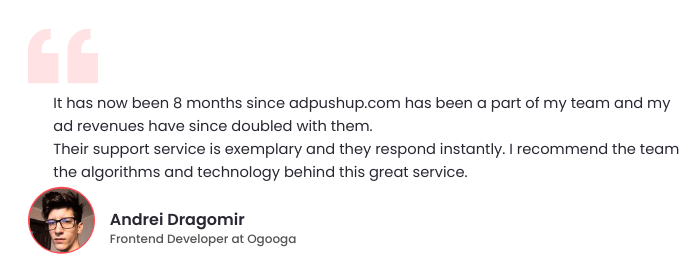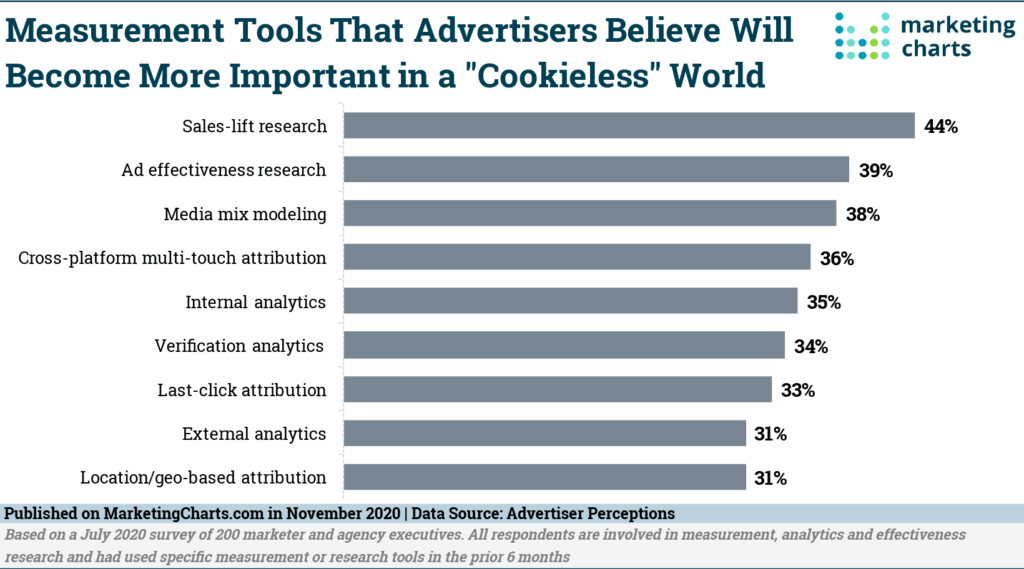Have you ever wondered how certain ads always manage to reach the right audience at the right time, making tons of profit on their way? It’s because they leverage smart, effective and highly personalized engagement strategies. These digital strategies grab the audience’s eyeballs and keep them glued to their screens.
If you are an online ad publisher, chances are you’ve wondered at some point how to get more subscribers and how to connect with your audience more deeply. To talk in terms of numbers, GlobalData, a leading data and analytics company, forecasts the ad-tech industry to grow from $438bn in 2021 to $1 trillion in 2030, revolutionizing the digital strategies and advertising sphere.
With more and more companies boosting their digital advertising expenses up to 25.5% in 2021, keeping your audience hooked with your ads becomes the hallmark of successful engagement strategies for publishers.
Also Read: How First-Party Data Will Drive User Engagement and Revenue in a Post-Cookie World
So, when ruling the online ad space becomes a must to thrive in this digital publisher space, why aren’t all ad publishers able to make their mark?
Let’s dive into the major ad-tech industry challenges companies and ad publishers are facing right now.
Ad-Tech Industry Challenges
The Farewell of Third-Party Cookies
Not too long ago, ad publishers were using analytics cookies that generated valuable data on user behaviour. These cookies were used by the classic digital advertising industry to track user’s browsing activity, including which ads they clicked on, how long they browsed a particular website and how much time they spent on their website. However, in recent years the use of third-party cookies has become quite controversial due to its potential misuse by advertisers.
Browsers like Safari and Firefox have already banned third-party cookies by default. Google also plans to block cookies from Chrome by the end of 2023, making it a big task for ad publishers to keep track of their target audience.
The Big Headache of Ad- Fraud
As one of the most expensive problems in the digital publisher and advertising industry, ad fraud causes a loss of billions of dollars worldwide – costing up to $35 billion annually. What’s even more worrying is that bot traffic and other types of fraud increasingly threaten to destroy trust in advertising. Thus, companies have a choice – spend big money on solving this problem or use a technology provider.
Ad publishers can reduce ad fraud by combining various anti-fraud programs and AI to reduce the risk of bot traffic. As part of the solution, publishers need to invest in ad verification technology that can help them identify fake clicks on their websites.

The CTV Rise Among Viewers
We’ve seen a surge in the number of hours that people are watching CTV content — which hasn’t escaped the attention of digital publishers. With a higher percentage of time spent on CTV devices than normal, it’s imperative to find ways to appeal to a wider audience.
Ad publishers can use a variety of strategies to engage with the coveted CTV audience, including working on integrations with other companies’ brands. With the rise of CTV advertising, digital publishers need to ramp up their game and provide more advanced contextual targeting and timing in their ads. For example, a fictional story could be set in a certain area of town and have an ad appear right before it that would then take viewers to a website describing the latest store openings in their area.
The Issue Of Ad-Blockers & Low Click-Through Rates
It’s no wonder that ad blocking is one of the biggest challenges for AdTech professionals. According to Backlinko, almost half of all internet users worldwide use ad-blocking tools. This points to one of the biggest challenges for digital publishers: finding ways to make their ads more appealing to users.
The downside of creating engaging ads is that it will make it harder for users to find and click through the ad, thus creating a poor ad experience. Therefore, marketers would be well advised to focus on making sure that their ads are highly relevant to user interests. Possible solutions include more innovative design, additional animations, interactive videos, and native formats that look like related articles.
Now that we’ve browsed through 5 of the popular challenges in the ad-tech space, it’s time to explore some effective engagement strategies that are impressive, imaginative and impactful.
Also Read: AdPushup Insider: Recovering Ad Revenue with AdBlock Recovery
Beat The Ad Obstacles with Engagement Strategies That Actually Work
Digital ads are becoming more and more competitive, with publishers trying new channels and approaches to take advantage of the opportunity that the rapidly changing media landscape presents.
Here’s how you can raise the bar with your ad engagement strategies:
Personalized Ad Content for the Win
Wouldn’t it be wonderful if you could get into the mind of your readers? With an eye toward data and analytics, ad publishers and agencies can work on strategies to develop personalized content recommendations based on their users’ reading habits, interests, behaviours and browsing patterns.
Take a cue from media giants like Netflix and Amazon and adopt a more personalized ad-content strategy. By targeting the ads and content to specific groups of readers, digital publishers can increase the number of time viewers spend engaging with their ad and ultimately drive more traffic.
Adopt Alternatives for the Cookie-Less Ad- World

After the announcement that cookies will be blocked, ad publishers are working hard to find alternative methods of data collection on target audiences to maintain transparency and adhere to new privacy standards.
Now, businesses have to consider alternate digital strategies of contextually targeted advertising through keyword searches and user interests. Companies like BritePool are developing user tracking through encrypted email addresses instead of cookies. This allows marketers to account for how users act on different networks around specific topics, categories and content preferences — which has a big impact on online marketing strategies.
Also Read: AdSense Alternatives: Top 25 Ad Networks to Try in 2022
You Just Cannot Miss The Mobile Optimization
Mobile usage has grown tremendously over the past few years. This is especially true after the COVID-19 lockdown, with people spending many more hours on their phones browsing the Internet. Thus, by optimizing the performance of your ads for mobile users, you can gain new customers and profits.
One of the smart ways to leverage the digital strategies can be by optimizing the responsiveness, load speed, user interface and performance of the ads, which can translate to increased revenue in lesser time.
Build a Strong Online Community
In this digital era, ad publishers need to focus on gaining sufficient traction with their audience by creating a strong social media presence and reputation. This will allow them to connect with more people that trust them as an authority.
Moreover, they can build loyalty among the readers by creating a strong community within their website or platform where they draw inspiration from and portray genuine interactions between their readers. This can greatly improve their sales and conversions as the audience will perceive their offerings as more “valuable” and “worthy”.
Never Forget the Good Old SEO
Today, most major ad publishers rely on traffic from search engines and social media to promote their content. To maximize the reach of all their content, it’s essential that they invest in SEO and follow the latest SEO trends and practices.
Apart from search engine optimization, ad publishers also need to focus on the visual appeal and content quality combined with Al technologies for better targeting and audience engagement.
In a Nutshell
There is no denying that modern engagement strategies are putting the ad industry on fire! AdTech is constantly evolving, and so are the strategies to engage audiences. If you have an engagement strategy that needs some more work, it’s a great time to act on it.
Modern engagement strategies can help your ad get noticed and be remembered by people who come across your ads, taking your revenue numbers up and growing.
Frequently Asked Questions
Use a marketing mix of engagement strategies rather than concentrating all of your emphasis on one method. Engage your audience online, offline, and through physical media by using advertising.
Run competitions and distribute vouchers. Keep track of the advertising efforts that create the best results and replicate them in fresh ways.
A person or business who displays ads on their digital space is known as an ad publisher.
They establish a connection between the user (someone who could make a purchase) and the advertiser, and they generate income by showing these adverts on their website, typically through CPC or CPA offers made through an ad network.
Ad engagement strategies streamline ad interactions and activities to deliver a high-quality customer experience. The process includes a mix of communication platforms to create a relationship, boost satisfaction, and deliver top-notch customer experiences.
These are the top 5 engagement strategies to impress your audience:
a. Your ads must be contextually relevant and personalized.
b. Make your ads interactive and fun.
c. Use videos and music to boost engagement.
d. Involve your audience by asking them questions.
e. Leverage native ads and digital strategies for authenticity.

Shubham is a digital marketer with rich experience working in the advertisement technology industry. He has vast experience in the programmatic industry, driving business strategy and scaling functions including but not limited to growth and marketing, Operations, process optimization, and Sales.







